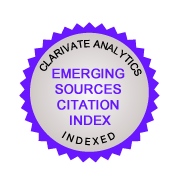THE EFFECTS OF CLASSROOM LEARNING ENVIRONMENT AND LABORATORY LEARNING ENVIRONMENT ON THE ATTITUDE TOWARDS LEARNING SCIENCE IN THE 21ST-CENTURY SCIENCE LESSONS
DOI:
https://doi.org/10.32890/mjli.2017.7795Keywords:
21st century learning, attitude towards learning science, lower secondary students, science laboratory and classroom learning environmentAbstract
Purpose – Many students associate science with negative feelings and attitudes which discourage them from continuing with science. This is supported by findings indicating a positive correlation between attitude and achievement. The learning environment is an important construct that influences students’ attitude. Following the claim that attitude is important and the learning environment is the determinant of learners’ attitude, in this study, an attempt is made to investigate the effects of classroom learning environment and laboratory learning environment on students’ attitude towards learning science. Methodology – Survey research design was used to identify the students’ perception of learning environment and attitude. A total of three sets of questionnaires on science laboratory, classroom learning and attitude towards learning science were administered to 272 (109 males and 163 females) lower secondary school students. Purposive sampling approach was used to identify the samples. Multiple linear regression was used to answer the research questions.Findings – The results show that attitude towards learning science is positively correlated with both classroom learning environment (r =.515) and science laboratory learning environment (r =.526). Both classroom learning environment and science laboratory learning environment are significant predictors of attitude. Cooperation, Equity and Investigation from the WIHIC and Integration, Material Environment and Students Cohesiveness from the SLEI are identified as significant predictors of attitude. Significance – The findings obtained from this quantitative survey suggest the presence of causal effects among the learning domains. This finding suggests that teachers should seriously consider the causal effects of the domains when designing their teaching strategies to enable the development of 21st-century skills.
Metrics
Metrics Loading ...
Additional Files
Published
27-12-2017
How to Cite
Karpudewan, M., & Meng, C. K. (2017). THE EFFECTS OF CLASSROOM LEARNING ENVIRONMENT AND LABORATORY LEARNING ENVIRONMENT ON THE ATTITUDE TOWARDS LEARNING SCIENCE IN THE 21ST-CENTURY SCIENCE LESSONS. Malaysian Journal of Learning and Instruction, 25–45. https://doi.org/10.32890/mjli.2017.7795
Issue
Section
Articles




























